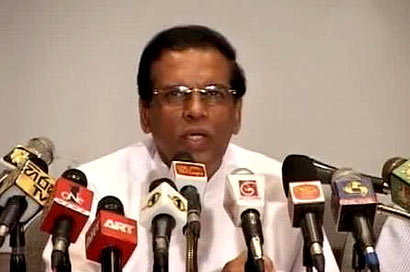New regulations for private hospitals

In the wake of widespread medical negligence and mishaps at private medical institutions, the Health Ministry has decided to introduce far-reaching amendments to the Private Health Services Regulatory Council (PHSRC) Act of 2008 including the introduction of fixed price formula for medical care, drugs, medical equipment and tests.
Under the new amendments drafted on the instructions of Health Minister Maithripala Sirisena, a special medical report would be prepared and submitted to the court by the PHSRC if and when the family of the victim decides to take legal action in the event of medical negligence at a private hospital.
The PHSRC would be empowered to visit any private medical institution at any time of day and conduct an investigation on any issue or complaint.
Minister Sirisena had appointed a 12 member committee headed by Karunasena Hettiaarachchi, National Water Supply and Drainage Board Chairman to look into the issue and recommend necessary amendments to the Act.
“The main weakness of the current Act is that the Health Ministry has no power to enter a private hospital and conduct an inquiry. It also does not have power to put a ceiling on the exorbitant prices charged through channel practices and private hospitals / nursing homes,” the spokesman said.
“It is a known fact that some medical specialists charge patients extremely high fees. It varies from Rs. 1,000 to Rs. 10,000 a patient. They have come to this position through the free education system of the country. The fees charged by private hospitals are unbelievable and the quality of treatment at many private hospitals is below par to the government healthcare service. The objective is to put in place a price regulatory system for each and every medical facility of private hospitals,” he said.
The amendments would bring the prices charged for drugs, medical equipment, inward patient care, surgeries and medical tests to an affordable level but it would vary on the rankings of the hospital based on the facilities provided by each private hospital, a spokesman of the Health Ministry said.
Citing one example, he said private hospitals and nursing homes obtained blood from the National Blood Transfusion Unit at Narahenpita (NBTU) free of charge. The NBTU charges Rs. 575 only for the kit that contains blood. The Ministry has received complaints from the public that some private hospitals have charged fees as high as Rs. 50,000 for a pint of blood obtained from the NBTU which is highly unfair, the spokesman stressed.
The amendments are expected to give more legal teeth to the PHSCR Act enabling the Director General of Health Services or his deputy to entertain public complaints against private hospitals, nursing homes and private medical practitioners /specialists by the public and take legal action against them, he said.
In Sri Lanka 50% of the population sought state medical assistance and 10%, private hospital treatment. There are about 250 private hospitals and nursing homes and about 1,000 private laboratories, channel services and ambulance services. The number of private medical practitioners spread around the country is about 10,000, he said.
Health Minister Sirisena is determined to present the draft amendments to Parliament within this year after the Attorney General was consulted, the spokesman said.
(Courtesy: DM Online)
Latest Headlines in Sri Lanka
- Sri Lanka declares essential services to ensure recovery after Cyclone Ditwah January 31, 2026
- Sri Lanka disburses Rs. 50,000 relief to 70% of Cyclone Ditwah victims January 31, 2026
- Sri Lanka to launch national review on social media’s impact on children January 30, 2026
- Sri Lanka, Saudi Arabia move to boost industrial cooperation January 30, 2026
- Johnston Fernando, two sons and others further remanded until February 13, 2026 January 30, 2026


